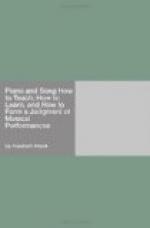Fourth Lesson. New exercises for striking stretches, and for the extension of the hand and fingers; but this must be done prudently, that the sound touch, which is always of the first importance, shall not be endangered. Besides this, the repetition of the exercises learned in the preceding lessons; but all to be played with a certain shading and delicacy. We will to-day begin at the beginning, with the introduction. I will now make amends for my want of regularity, and show you that I can begin at the beginning, like other people; but all in good time. To-day, in those portions of which you have acquired a mastery, we will give particular attention to the expression, and to the correct use of the pedal. If what I suggest to you with regard to the shading at any place does not entirely correspond to your understanding of the piece, or to your feeling, you must at once express your difference of opinion, and ask me for the reason of my view. You, perhaps, do not like to play this place crescendo, but diminuendo. Very well; only play it finely in your own way; it will also sound very well so. I proposed the crescendo there, because the feeling grows more intense; perhaps, in the next lesson, you will acknowledge that I was right. This place I should play a very little slower, though without a striking ritardando; then a little faster here; do you think it ought to be played crescendo or diminuendo? We must try in this variation to present nicely shaded little pictures. Here you might use more energy and decision. This place you should play merely with a correct mechanical execution, but without special expression; for we require shadow, in order that the succeeding idea, eminently suggestive of the theme, shall be brought out with more brilliancy. In general, the whole must be made to sound natural, without musical pretension, and as if it were the production of the moment; and should not create a distorted, overdrawn effect, or exhibit modern affectation.
Each piece that I undertake to teach you will give me an opportunity to talk to you a great deal about the correct expression in playing, and about its innumerable beauties, shades, and delicacies; while I shall pay constant attention to the production of a beautiful singing tone. The next piece will be Chopin’s Notturno in E flat; for your touch has already gained in fulness, and is now unobjectionable.
This is the tyranny with regard to correct execution, which stupidity and folly have taxed me with having exercised towards my daughters. “Expression must come of itself!” How cheap is this lazy subterfuge of the followers of routine, and of teachers wanting in talent! We see and hear a great many virtuosos, old and young, with and without talent, renowned and obscure. They either play in an entirely mechanical manner and with faulty and miserable touch, or else, which is less bearable, they strut with unendurable affectation and produce musical monstrosities. In order to conceal their indistinct mode of execution, they throw themselves upon the two pedals, and are guilty of inconceivable perversions.




